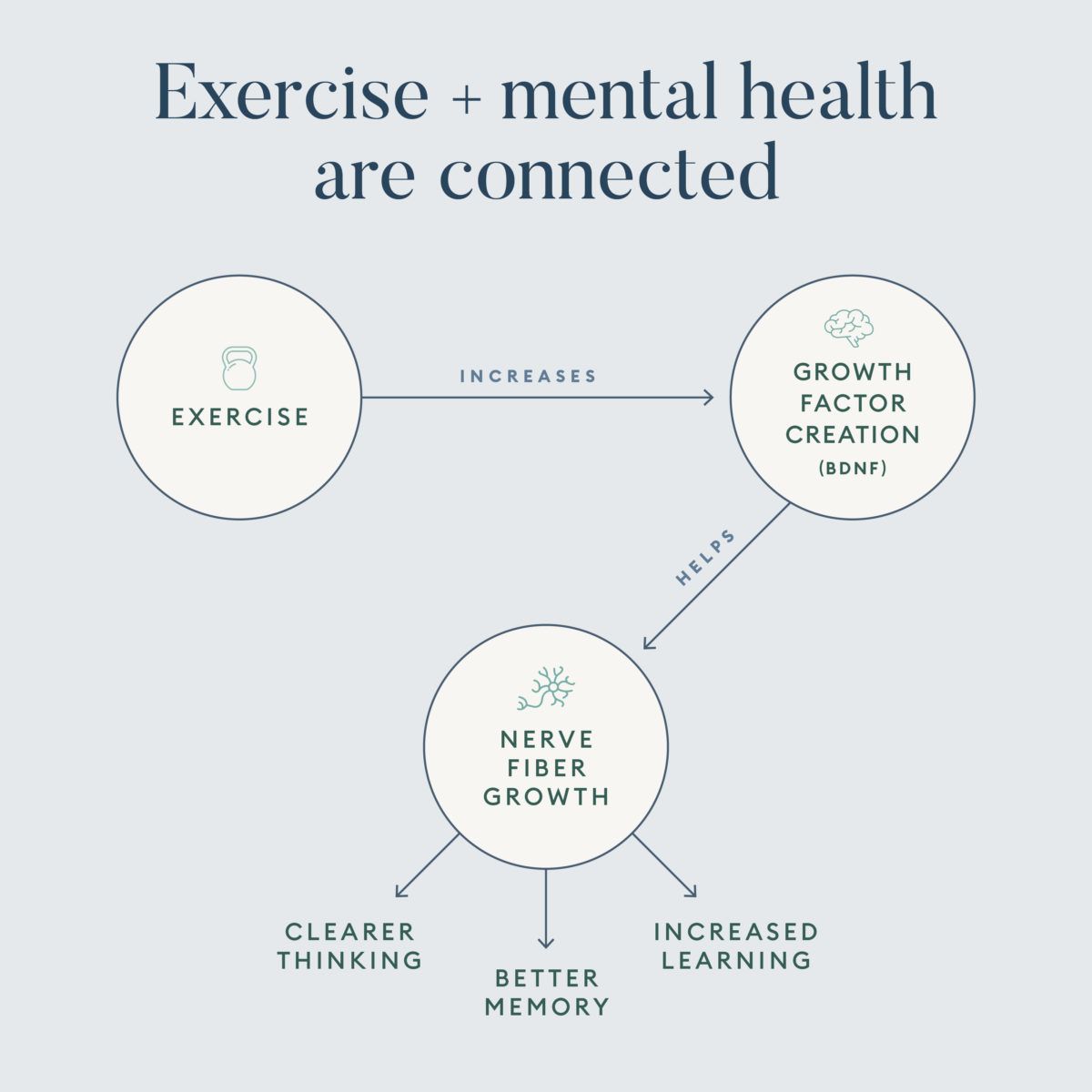The link between exercise and mental health has long been established, and as research uncovers more about this relationship, we’re finding that there are certain ways workout habits can be adjusted to optimize our mental wellbeing. Here are five ways to make sure your mind gets the most out of your workouts.
The mind-body connection is a hot topic in today’s health climate. Scientific research has made it clear that mental health can have an impact on various areas of physical health—from your gut microbiome to your weight and even inflammation levels. And the exercise and mental health connection goes both ways: We can positively impact our mental health by improving our diet, for example.
Another proven strategy: “We know that movement is effective for improving mental health,” says Caroline Hoeffgen, a health coach at Parsley Health. “That’s been established over and over again.” There’s a plethora of research showing that exercise can help people with clinical depression and anxiety, for example.
 And observational data shows people who are active are generally happier. For instance, a large-scale epidemiological study published in the Lancet in 2018 looked at over 1.2 million Americans, their exercise habits, and their mental health. The findings were clear: those who exercised regularly experienced fewer days per month of poor mental health.
And observational data shows people who are active are generally happier. For instance, a large-scale epidemiological study published in the Lancet in 2018 looked at over 1.2 million Americans, their exercise habits, and their mental health. The findings were clear: those who exercised regularly experienced fewer days per month of poor mental health.
As for exactly how exercise and mental health are connected, there are quite a few mechanisms on the table—some theoretical, and some proven. For instance, most people know about the mood-boosting endorphins that are released during exercise.
We also know that exercise increases blood circulation to the brain and increases the production of brain-derived neurotrophic factor (BDNF), Hoeffgen explains. Research has shown this happening in both mice and humans. “Increased BDNF helps more nerve fibers grow, which helps with better thinking, memory, and learning—which can all provide relief for mental illness.” This is also one of the reasons exercise is thought to help stave off age-related brain degeneration, such as Alzheimer’s and dementia.
Another link between exercise and mental health? Exercise increases self-efficacy, or the trust we have in ourselves that we can handle difficult situations and actually show up, Hoeffgen says. That in itself may be enough to improve mental wellbeing in people with and without a specific mental health disorder.
But regardless of the exact mechanism, it’s undeniable that exercise can make a big positive impact on mindset and mood. Here’s what you need to know to optimize your routine for the biggest lift.
The best ways to exercise for mental health benefits
1. Aim for 3 to 4 days of exercise per week.
There’s conflicting evidence about what type and how much exercise is most beneficial for mental health, according to Hoeffgen. Her advice based on the body of research and her clinical experience? Try for a minimum of 30 minutes of exercise 3 to 4 times a week at a moderate to vigorous intensity that leaves you somewhat breathless. Any type of exercise you’ll be most consistent with will do.
A recent study published in Health Psychology supports Hoeffgen’s recommendation. Researchers followed a group of mentally and physically healthy but inactive people through 12 weeks of a new exercise program that involved 35 minutes of exercise 4 times a week.
Afterward, the participants had to stop exercising for 4 weeks. The researchers found that people felt less depressed and hostile after the 12-week exercise program, and that these markers worsened after taking 4 weeks off from exercise.
2. Only add longer, more frequent workouts if you enjoy them.
“Longer or more frequent workout sessions may be more effective when feasible,” Hoeffgen says. For people who are already exercising and want to increase the benefits, a good general recommendation is to aim for 2.5 hours per week of moderate-intensity aerobic exercise, she says. Ideally, this is spread out throughout the week and would include resistance training twice a week, which not only has a host of physical health benefits, but has also been linked to improved symptoms of depression, like low mood.
But going overboard could result in worse mental health. The same Lancet study mentioned earlier also found that people who exercised more than 90 minutes per day didn’t experience the same mental health benefits as those who had more moderate workout schedules. And a study done on people in lockdown in China due to COVID-19 had similar findings. People who exercised more than 2.5 hours per day expressed less satisfaction with their life than those who exercised less.
3. When anxiety is an issue, consider high intensity exercise.
Exercise acts on the hypothalamic pituitary adrenal (HPA) axis, or the body’s central stress response system, by reducing our physical reaction to stress. “By exercising, our bodies become more familiar with ‘fight or flight’ sensations—such as an increased heart rate and sweating—in a non-threatening situation, which can help build tolerance to these sensations,” Hoeffgen says.
That can translate to a better ability to handle stress in the moment, and a recent meta-analysis concluded that exercise is a viable treatment option for anxiety for this reason. Interestingly, researchers found that high-intensity exercise was a better option for anxiety than low intensity exercise, perhaps because of its ability to imitate the fight-or-flight response.
4. If you can, exercise outdoors or in a group.
Though it might be tricky to do so these days, exercising in group settings may intensify mental health benefits, according to Hoeffgen. This may make team sports, group exercise classes, or exercising with a partner ideal for those looking to boost their mental health.
Perhaps more feasible at the moment is outdoor exercise. “Outdoor physical activities add in the benefits of being surrounded by nature, which activates our parasympathetic nervous system,” Hoeffgen says. From reduced cortisol levels, to better sleep, to better overall mood, the benefits of outdoor exercise are well-documented, so it’s worth trying to get out in nature for at least some of your workouts.
5. Most importantly, choose activities you enjoy.
There’s lots of research out there about the effects of various types of exercise on mental health. For example, yoga has been shown to help reduce symptoms of anxiety and depression.
But when you look at the overall body of research, there’s something else that matters more: “The type of exercise or whether the exercise is carried out in a group or individually may be less important than tailoring the exercise to your abilities and preferences,” Hoeffgen explains. “Ultimately, we need to find a sweet spot. Exercise should not be unpleasant, but just enough of a challenge.”
 And observational data shows people who are active are generally happier. For instance, a large-scale epidemiological study published in the Lancet in 2018 looked at over 1.2 million Americans, their exercise habits, and their mental health. The findings were clear: those who exercised regularly experienced fewer days per month of poor mental health.
And observational data shows people who are active are generally happier. For instance, a large-scale epidemiological study published in the Lancet in 2018 looked at over 1.2 million Americans, their exercise habits, and their mental health. The findings were clear: those who exercised regularly experienced fewer days per month of poor mental health.

